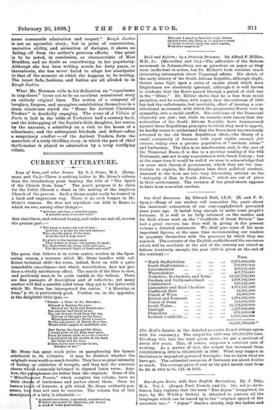CURRENT LITERATURE.
Lays of Iona, and other Poems. By S. J. Stone, M.A. (Long- mans and Co.)—There is nothing better in Mr. Stone's volume than the introductory poem bearing the title of " The Spirit of the Church from Iona." The poet's purpose is to claim for the Celtic Church a share in the making of the Anglican Church of the present. Such a theme might easily be treated in a hard and ungracious way. There is no such temper in Mr. Stone's stanzas. He does not repudiate our debt to Rome, to which we owe, among other things,— " art-lore, art-love, a statelier guise, A prouder port, a sterner will."
But stateliness, and outward beauty, and order are not all, or even the greater part:-
' Yet heart is more and soul of love ;
And this in prime we owe not there ;— Who says the glory of the dove Is in the iris it may bear Its glory is the rapture pore That makes in peace, not power, its goal : The Homeward speeding, swift and sure, The Heavenward flight of heart and soul.'
The poem that follows is in seven cantos, written in the Spen- serian stanza, a measure which Mr. Stone handles with suf- ficient technical skill—his verse, indeed, flows on with a quite remarkable smoothness—but which, nevertheless, does not pro- duce a wholly satisfactory effect. The march of the lines is slow, and perilously near, to be quite candid, to the tedious. There are fine passages of description and of reflection; yet many readers will find a sensible relief when they get to the lyrics with which Mr. Stone has interspersed the cantos. " A Morning on Iona," p. 90, is particularly good. Further on, in the appendix, is the delightful little lyric :—
"DERRY: • SONG OF ST. OOLUNBA. Beloved is Raphoe the Pure
Beloved are Hells and Dnunhome: But sweeter and fairer to me The salt breezes fresh from the sea, The cry of the gulls on the foam, When homeward to Derry I come— To the oak-groves of Derry, from far, Where GOD s angels in multitude are.
Fair Derry, for thee and for thine, I would give—if all Erin were mine From its centre right on to its strand— I would give all the wealth of the land For thine and for thee
0 thou fairer and sweeter to me, Sweeter to me I "
Mr. Stone has spent much pains on paraphrasing the hymns attributed to St. Columba. It may be doubted whether the originals wernworth so much trouble. They have no great intensity of feeling o subtleties of thought, and they lack the sonorous charm whit commonly belonged to rhymed Latin verse. Any- how, the phrases are better than the originals. Some of the " Misoell ous Poems," which complete the volume, have no little ch of tenderness and pathos about them. Once we have a to h of humour, a gift which Mr. Stone evidently pos- sesses, bu does not care to exercise. The solemn fun of this descriptio of a baby is admirable
A aluwb'rons thing, long-robed, expressionless, Without the power of language, yet withal A mine of vocal possibilities.
Whei-eon I gazed in fear lest cruel chance Should rouse this Etna in its mother a arms To burst in wrath upon the day's repose, With cries imperious."






































 Previous page
Previous page